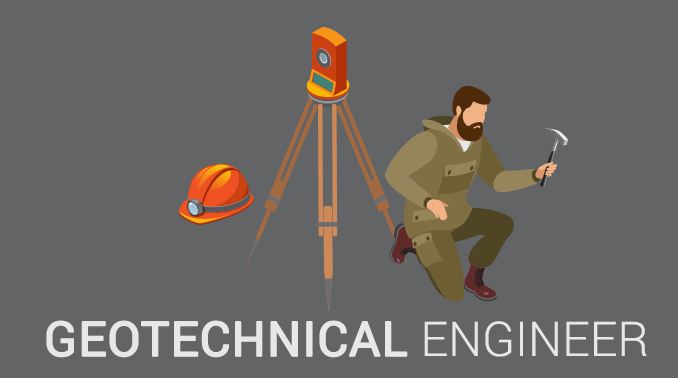The Of Consulting Engineers
The Of Consulting Engineers
Blog Article
More About Consulting Engineers
Table of ContentsHow Consulting Engineers can Save You Time, Stress, and Money.Our Consulting Engineers Statements6 Easy Facts About Consulting Engineers Shown10 Easy Facts About Consulting Engineers DescribedFascination About Consulting EngineersAll about Consulting Engineers
To supply the ideal experiences, we use innovations like cookies to store and/or access device information. Consenting to these technologies will allow us to process information such as browsing habits or distinct IDs on this site.They conduct site investigations, gather examples, carry out research laboratory tests, and assess information to review the viability of the ground for building tasks. Based upon their searchings for, geotechnical designers supply suggestions for foundation layout, slope security, keeping structures, and reduction of geotechnical hazards. They collaborate with various other professionals, such as architects, architectural engineers, and building teams, to guarantee that geotechnical considerations are integrated into the overall job design and execution.
Get This Report on Consulting Engineers
They interpret the data to understand the buildings and behavior of the soil and rock, including their strength, leaks in the structure, compaction attributes, and groundwater problems. Geotechnical Analysis and Style: Geotechnical designers examine the information gathered throughout website investigations to examine the stability and suitability of the website for building and construction projects. They carry out geotechnical computations and modeling to examine factors such as bearing ability, negotiation, incline stability, side earth pressures, and groundwater circulation.
Structure Design: Geotechnical engineers play a crucial duty in making foundations that can safely sustain the desired framework. They assess the dirt conditions and tons requirements to determine the appropriate structure type, such as shallow foundations (e.g., footings), deep foundations (e.g., piles), or specialized techniques like dirt enhancement. They consider elements such as settlement limits, bearing ability, and soil-structure interaction to establish ideal foundation designs.
Here are some types of geotechnical engineers: Structure Designer: Foundation designers focus on designing and examining foundations for frameworks (Consulting Engineers). They examine the dirt problems, lots needs, and site attributes to identify one of the most proper structure kind and style, such as shallow structures, deep structures, or specialized methods like pile foundations
An Unbiased View of Consulting Engineers
They execute field testing, accumulate samples, and analyze the collected data to characterize the dirt buildings, geologic developments, and groundwater problems at a site. Geotechnical Instrumentation Engineer: Geotechnical instrumentation engineers concentrate on tracking and measuring the actions of soil, rock, and frameworks. They install and maintain instrumentation systems that check elements such as dirt settlement, groundwater degrees, slope movements, and structural view website variations to assess efficiency and provide early cautions of possible issues.
In the office setting, geotechnical designers make use of specialized software application tools to carry out calculations, produce layouts, and evaluate information. They prepare records, review project specs, interact with customers and employee, and coordinate job tasks. The office setting gives a favorable environment for research study, evaluation, and collaboration with various other professionals entailed in the task.
What Does Consulting Engineers Do?
They regularly visit project websites to carry out site investigations, analyze geotechnical problems, and collect information for analysis. These check outs involve taking a trip to various areas, often in remote or challenging surfaces. Geotechnical engineers may execute dirt tasting, conduct examinations, and monitor building activities to make sure that the geotechnical facets of the project are being carried out properly.

Prior to any framework is built, engineers need first to assess it. This is to see if the ground is ideal and sturdy adequate to safely begin building and construction of a structure. The process is done via geotechnical examination. It offers details on the physical homes of soil earthworks for recommended structures and for the repair service of distress to earthworks that are brought on by subsurface problems.
About Consulting Engineers
This info can be used for a great deal a lot more. Keep analysis as we note down the several objectives of geotechnical investigations and why it is vital in geotechnical design. Geotechnical site examination is important in the construction process since it aims to recognize and give information on the website's subsurface conditions.

They are: This is where geotechnical design takes place to recognize the area's geology. All in all, it is done to examine the physical problems of the soil.
The Definitive Guide for Consulting Engineers
When this is done, the designers will certainly collaborate with the customer to see what sort of building they need. This is typically where they utilize borings or explorations to secure next page soil samples. Relying on the client's demands, these samples could also get examined in labs. Various other than this, the designers will likewise visually examine the soil for rock and water.
As soon as engineers have actually conducted their investigation, they will certainly need to create recommended services. Recognizing subsurface problems prior to the building of the site is necessary to ensure that the framework is built securely and can be properly supported.
Report this page